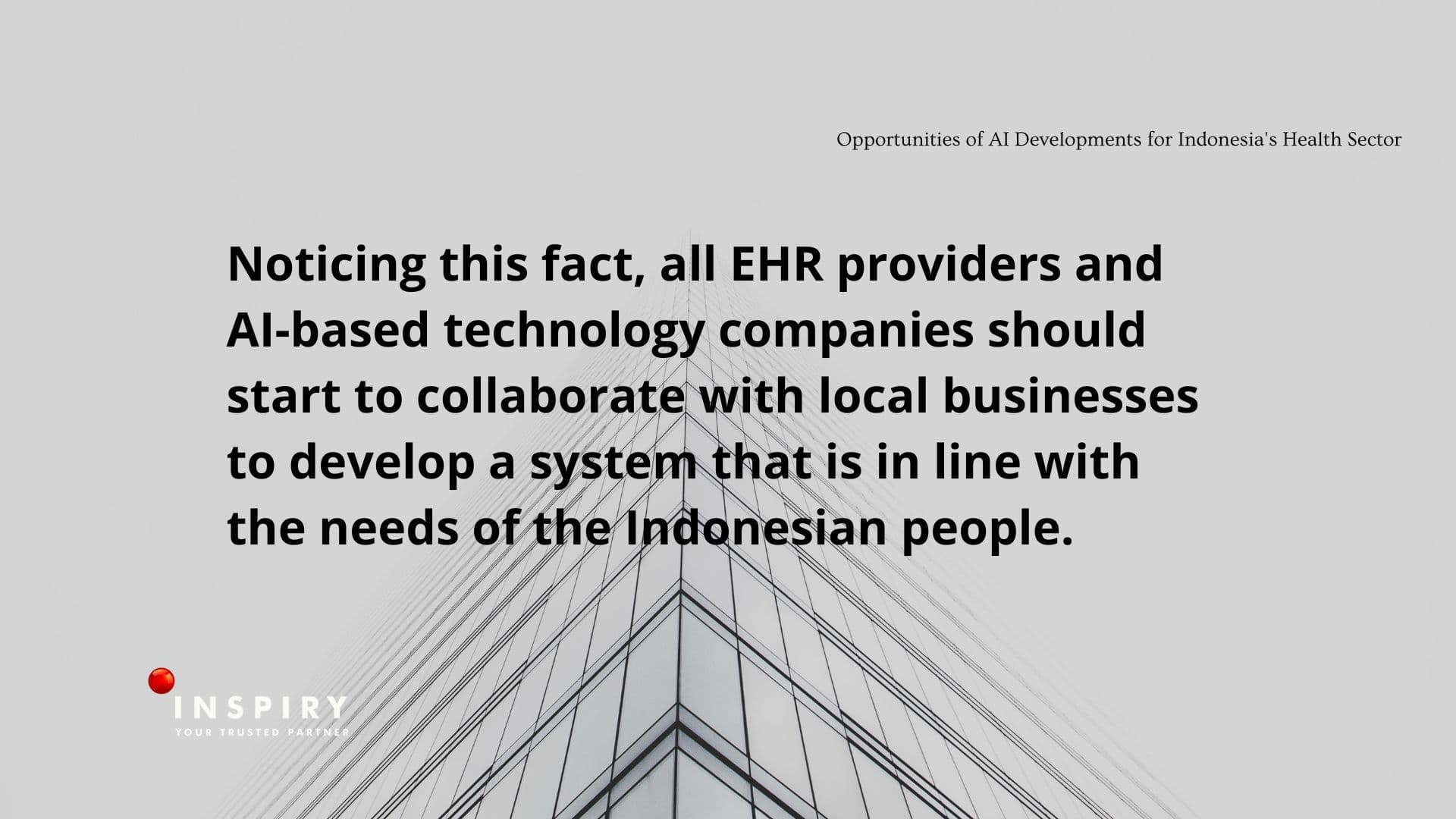
Blog Detail
Opportunities of AI Developments for Indonesia's Health Sector

What is Artificial Intelligence?
"Can machines think?" derived from the father of computer science, Alan Turing, described AI as a field that combines computer science and robust datasets to enable problem-solving. Artificial intelligence (AI) is a branch of computer science concerned with building intelligent machines that can perform tasks that nearly represent human intelligence. AI is not interchangeable with machine learning (ML) or deep learning. Deep learning is a form of machine learning, and machine learning is a subfield of artificial intelligence. Thus, to define AI most concisely, there are four components to consider in AI technology:
Act humanely, a system that can act like a human.
Think humanely, a system that can think like a human.
Rational thinking, a system that can think rationally.
Act rationally, a system capable of acting rationally.
Current Implementation of AI in Health Sector
Artificial intelligence (AI) impacts various sectors, including health care. AI applications in clinical, diagnostic, surgical, rehabilitation, and predictive practices. Healthcare organizations collect extensive data. AI technologies can analyze this data and uncover patterns and insights that humans alone would not have been able to find. Deep learning powered by AI enables healthcare organizations to use algorithms to improve business and clinical decision-making and improve the quality of the experience they deliver.
The most widely discussed topic on the internet is AI chatbots. This technology may promote a healthy lifestyle by promoting healthy eating habits and give the solution for maintaining healthy eating patterns constantly. AI technology is also implemented in WELT smart belts to measure and track waist size and tension. This technology is to prevent people from eating too much.
The AI chatbot may also advise on treatment by analyzing the symptoms throughout the chat. Although this may be applicable, it is considered to be unethical. Because the diagnosis should be confirmed by the doctor. At this time, the implementation of AI in diagnosis has been used for reading mammograms to assist the doctor while predicting breast cancer. Several diagnostic methods in the early stage of cancer have used AI technology to help the doctor to diagnose faster.
At Imperial College London, Dr. Gen Blocker is developing BrainWear, a wrist-worn tracker device to gather high-quality physical activity data from brain tumor patients in a non-intrusive manner. The change in PA describes the recurrence and progression of the disease, and the quality of life. The development of AI will be inevitable. Healthcare providers should develop their mindset for working effectively using AI thus increasing the efficiency of the cost and the operational procedure.
The Next Breakthrough of AI
The next breakthrough will be related to the drug-discovery process. Using AI, researchers can sift through large amounts of patient outcomes data to help the researcher to select the substances that are likely to be more effective against a disease.
In the future, AI can analyze vast amounts of data from clinical trials and patient records, helping healthcare providers to decide the best treatment for a particular disease. It is beneficial for the researchers to prioritize which compounds should be analyzed further in the lab. With the help of AI, clinical trials also may become more effective. This strategy could speed up the development process so new drugs will enter the market faster.
The Importance AI for Improving Indonesia's Health Sector
Indonesia ranks 92nd in the World Health Organization for its healthcare system. It shows that Indonesia should start to adapt technology to push development significantly, for example, the implementation of AI. In Indonesia, patient data is still poorly regulated, AI will help Indonesia to structure its data. Many private hospitals, such as Siloam Hospitals, and Primaya Hospital Group implement EHR developed by AI. These three hospitals show an increase in overall operational efficacy. Advancing the implementation, public hospitals should gradually; equipped with EHRs that integrate based on the data from BPJS.
Noticing this fact, all EHR providers and AI-based technology companies should start to collaborate with local businesses to develop a system that is in line with the needs of the Indonesian people. PT Inspiry Indonesia Konsultan will help companies around the globe to collaborate with our clients in Indonesia to achieve mutual benefits for each other.
Contact us via:
E-mail: inspiryindonesiakonsultan@gmail.com
Website: www.inspiryconsultant.com
Instagram: @inspiry.indonesia
Mobile: +62 877 6777 1778
Salam Inspirasi,
apt. Syifa Amirta Sani, S. Farm
